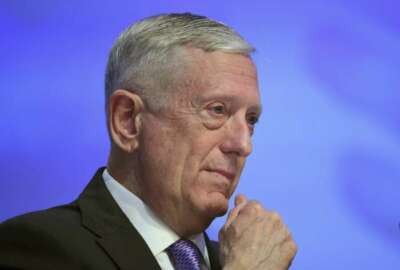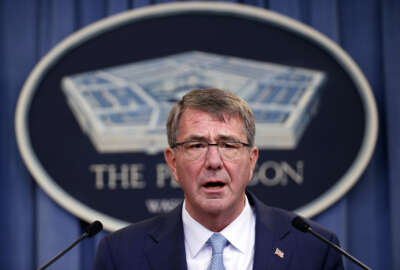
Trump bans transgender people from military despite bipartisan criticism
President Trump tweets out a new policy just weeks after Defense Secretary Mattis ordered a six month review.
Just weeks after Defense Secretary Jim Mattis ordered a six month review on the Defense Department’s transgender policy, the Trump administration is banning transgender people from the military.
President Donald Trump announced over Twitter this morning that the government will not accept or allow transgender individuals in the military.
“After consultation with my Generals and military experts, please be advised that the United States Government will not accept or allow Transgender individuals to serve in any capacity in the U.S. military. Our military must be focused on decisive and overwhelming victory and cannot be burdened with the tremendous medical costs and disruption that transgender in the military would entail. Thank you,” Trump’s tweets stated.
After consultation with my Generals and military experts, please be advised that the United States Government will not accept or allow……
— Donald J. Trump (@realDonaldTrump) July 26, 2017
….Transgender individuals to serve in any capacity in the U.S. Military. Our military must be focused on decisive and overwhelming…..
— Donald J. Trump (@realDonaldTrump) July 26, 2017
….victory and cannot be burdened with the tremendous medical costs and disruption that transgender in the military would entail. Thank you
— Donald J. Trump (@realDonaldTrump) July 26, 2017
….victory and cannot be burdened with the tremendous medical costs and disruption that transgender in the military would entail. Thank you
— Donald J. Trump (@realDonaldTrump) July 26, 2017
A 2016 estimate by the RAND Corporation states there are between 1,320 and 6,630 transgender people in active duty alone. Thousands more are in the guard and reserve components.
The announcement is a complete reversal from President Barack Obama’s policy that allowed transgender people in the military to serve openly and to have medically necessary treatments covered by the government.
DoD says it will provide revised guidance in the near future on the ban.
The “tremendous” cost Trump is referring to amounts to $2.4 million to $8.4 million annually, the RAND study stated.
“The cost represents a 0.04- to 0.13-percent increase in active-component health care expenditures,” the study stated.
The cost equals .00038 to .0013 percent of the approximately $640 billion base budget authorized by the House and Senate Armed Services Committees for 2018.
The RAND study stated between 29 and 129 service members in active duty would undergo transition related care per year.
Aaron Belkin, executive director of the Palm Center, called the policy change despicable. The Palm Center provided its expertise to the Obama administration during its decision to open the military to transgender people.
Belkin told Federal News Radio Trump’s decision is purely a political move dictated from the White House. The military leadership who were consulted about the Obama transgender policy is still in place. The chiefs of staff of the Army and Air Force, the Chief Naval Officer, the Marine Corps Commandant and the chairman of the Joint Chiefs of Staff are all the same as they were under the Obama administration.
Latest Defense News
“The President is creating a worse version of ‘don’t ask, don’t tell.’ As we know from the sad history of that discredited policy, discrimination harms military readiness. This is a shocking and ignorant attack on our military and on transgender troops who have been serving honorably and effectively for the past year,” Belkin said in a statement.
Former Chairman of the Joint Chiefs Staff Adm. Mike Mullen told Congress yesterday to allow transgender people in the military.
“Thousands of transgender Americans are currently serving in uniform and there is no reason to single out these brave men and women and deny them the medical care that they require,” Mullen said in a statement to USA TODAY.
The policy change comes as the military is trying to widen its talent pool in order to recruit and retain the best and brightest. The Air Force already loosened its previous marijuana use rules and its tattoo rules to attract more people into the service. Other branches have made similar moves.
High profile political leaders were quick to criticize Trump’s transgender policy decision.
“This announcement is an unwarranted and disgraceful attack on men and women who have been bravely serving their country. These service members are defending the United States around the world as we speak, and they have long done so with distinction. To prevent transgender people from joining the military and to push out those who have devoted their lives to this country would be ugly and discriminatory in the extreme. Secretary of Defense Mattis is currently engaged in a six-month review of policies to bring in new transgender recruits, and he has determined that transgender people who are currently serving should continue to serve,” House Armed Services Ranking Member Adam Smith (D-Wash.) said in a statement.
Senate Armed Services Committee Chairman John McCain (R-Ariz.) also disapproved of the decision.
“Any American who meets current medical and readiness standards should be allowed to continue serving. There is no reason to force service members who are able to fight, train and deploy to leave the military — regardless of their gender identity. We should all be guided by the principle that any American who wants to serve our country and is able to meet the standards should have the opportunity to do so — and should be treated as the patriots they are,” McCain said in a statement.
Some interest groups are praising the decision.
“I applaud President Trump for keeping his promise to return to military priorities — and not continue the social experimentation of the Obama era that has crippled our nation’s military. The military can now focus its efforts on preparing to fight and win wars rather than being used to advance the Obama social agenda. President Trump recognizes what the nation’s military leadership and the American people realize, this Obama policy makes no sense,” Family Research Council President Tony Perkins said in a statement.
Rep. Vicky Hartzler (R-Mo.) called up an amendment during the 2018 defense authorization bill markup last month to nullify DoD’s policy allowing transgenders to serve openly in the military.
Hartzler immediately withdrew the amendment and only entered it to make a point, but there’s still a possibility the amendment could come up again when the bill goes to the House floor next month.
Related Stories
The transgender policy “is ill conceived and contrary to our goals of increasing troop readiness and investing budget dollars into shortfalls of the past. By recruiting and allowing transgenders to serve openly in our military we are subjecting the tax payers to high medical costs,” Hartzler said June 29.
The full DoD transgender policy was supposed to go into effect in the beginning of July. That policy would have helped transgender individuals transition into their identified gender.
Former Defense Secretary Ash Carter’s team extensively studied the effects of allowing transgendered individuals in the military by relying on input from top military leadership, medical and personnel experts in the Pentagon, transgender service members, outside medical experts, advocacy groups and the RAND Corporation.
The last year was used to implement the policy in stages to address the needs of service members, commanders and to train the entire force.
“Although relatively few in number, we’re talking about talented and trained Americans who are serving their country with honor and distinction. We invest hundreds of thousands of dollars to train and develop each individual, and we want to take the opportunity to retain people whose talent we’ve invested in and who have proven themselves,” Carter said during the roll out last year.
Mattis halted the initiation of the Obama era policy on June 30 to start the six month review.
“After consulting with the service chiefs and secretaries, I have determined that it is necessary to defer the start of accessions for six months. We will use this additional time to evaluate more carefully the impact of such accessions on readiness and lethality. This review will include all relevant considerations. My intent is to ensure that I personally have the benefit of the views of the military leadership and of the senior civilian officials that are now arriving in the department,” the June 30 memo from Mattis stated.
Copyright © 2025 Federal News Network. All rights reserved. This website is not intended for users located within the European Economic Area.
Scott Maucione is a defense reporter for Federal News Network and reports on human capital, workforce and the Defense Department at-large.
Follow @smaucioneWFED





